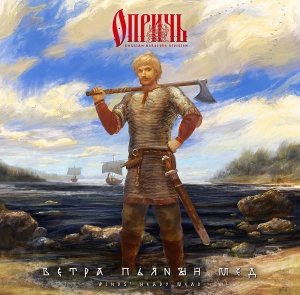
Russian warriors Oprich (it’s an old Russian word that means something like ‘unique’, ‘opposite’, ‘against’, ‘isolated’) return with a new epic tale, focusing on the glory of the past, the heroism and pride of Old. It’s called Wind’s Heady Mead, and it comes in an edition limited to 100 copies only (hand-numbered) on vinyl with cover artwork created by Igor Burlakov aka Dartgarry (think: North Diamond, Hagl, Grey Heaven Fall etc.). Oh yes, in case you’re interested: in the Archives of Concreteweb, on the update of August 29th 2012, you can find a review for a split with Oprich, Piarevaracien and Chur, which was released as well via the Russian Pagan Metal label Casus Belli Musica.
Wind’s Heady Mead aka Bетра пьяный мёд lasts for about twenty-five minutes, and the opening title track bewitches me as from the very beginning. Hypnotic flutes (with sounds of water and acoustic bass guitars), followed by tribal drum patterns and a heroic vocal choir, accompany us towards a majestic journey that holds the middle in between little catchy folklore at the one hand, and heroic power at the other. The song isn’t fast at all, yet it comes with such an overwhelming, powerful energy… Besides the clean choirs, there are some harsher shouts too, both screaming and grunting; and instrumentally, the medieval components reappear time after time. The ‘lack’ of fastness, the prominent use of flutes, and the organic structures continue into the next pieces too. В плеске вёсел starts with those flutes once again, as well as acoustic guitars, but pretty soon this hymn turns towards an epic and energetic piece that pays tribute to those who dies on the warfields a… Sorry, I was almost losing my self-control – but you know what I want(ed) to say, I think, so (otherwise: ***)… Totally contradictive is Волжская колыбельная, which is a very integer accoustic chant that returns to the emotional and subdued side of the pagan tradition
A highlight for sure is the Temnozor-cover Вольницей в просинь ночей, which starts quite tranquil and naturally-pure, getting joined soon by a female vocal sample (a male one follows soon) and a selection of traditional instruments – before totally getting loose in a mostly elemental essence / definition of Pagan / Folk tradition.
Oprich still stay true to their roots, though they have become more convincing, powerful and enigmatic, I think, in mean time. If this evolution continues, I will surely want to be the first one to experience this band’s next effort. But until then: Bетра пьяный мёд has to do!
